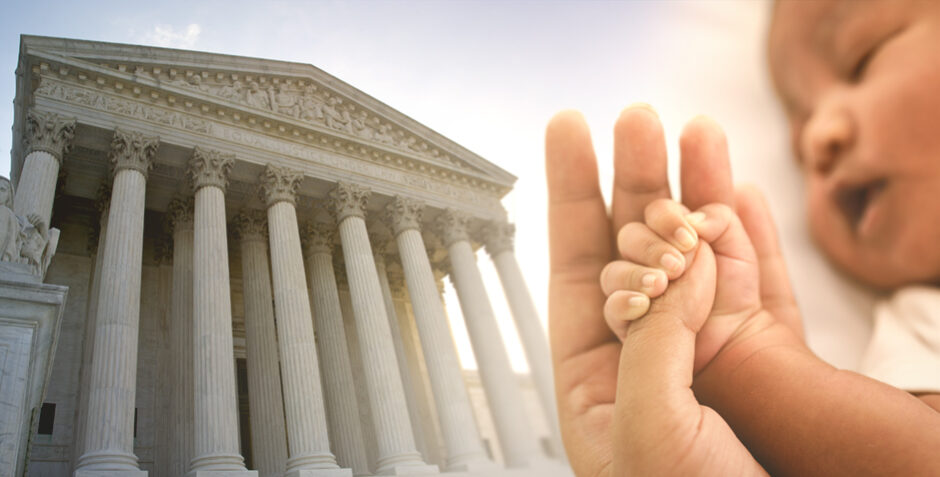On 29 July 2021, the ECLJ intervened as amicus curiae - i.e., as a third party - before the Supreme Court of the United States, in the case Dobbs v. Jackson Women's Health Organization. This case opposes the Mississippi Department of Health against an abortion clinic (JWHO) challenging the constitutionality of a March 2018 law banning most abortions after 15 weeks of pregnancy in the state. ECLJ's parent branch, the American Center for Law and Justice (ACLJ) was also an amicus curia to the Supreme Court filed an amicus brief separate from ECLJ's. Our written observations are available here and include all the citation references below.
The Dobbs case may be the first shift in the US abortion jurisprudence. It will provide an opportunity for the Supreme Court to make a reversal, or at least a softening, of its 1973 Roe v. Wade decision. Since then, banning on abortion before 24 weeks of pregnancy is considered unconstitutional, although states retain a (limited) margin of appreciation. The appointment of a new judge at the end of 2020, Amy Coney Barrett, contributed to the current buzz around the Dobbs case, as it lead to a conservative majority among the nine judges of the US Supreme Court possible. There is hope for change for the unborn and their advocates.
Towards a reversal of jurisprudence?
The law passed by Mississippi in 2018 protects the foetus from 15 weeks of pregnancy, except in cases of medical emergency or serious foetal anomaly. It has become common practice in the United States for federal courts, seized by representatives of the abortion business, to strip pro-life laws of their effect on the grounds of unconstitutionality. This happened in November 2018, with the JWHO clinic attacking the law the day after it went into effect. The district court threw out the law's application, claiming that states have the power to "regulate abortion procedures before foetal viability (24 weeks) as long as the measures are not disproportionate to the woman's right."
The Mississippi Department of Health appealed this decision and the Supreme Court has now agreed to rule on the constitutionality of the Mississippi law. The question that will guide its consideration is whether all bans on abortion before the foetus is viable are unconstitutional. If there were to be a reversal, the Roe v. Wade barrier may be breached, as some states would now be able to ban abortion before the threshold of foetal viability (before 24 weeks).
The ECLJ's comparative law contribution
Americans generally think that Europe is more liberal than the United States regarding abortion, which is totally wrong. As explained here, European states do not constitutionally protect abortion on demand up to 24 weeks of pregnancy. Thus, of the thirty-four Council of Europe member states that allow abortion on demand, twenty-nine only allow it during the first twelve weeks of pregnancy. The Netherlands is the only country with a legal time limit of twenty-four weeks, as in the United States. Moreover, unlike the US states, there is no legal obstacle to European states banning abortion with a simple law.
In its amicus curiae to the Supreme Court, the ECLJ provided comparative law to recall these facts. We also explained that the case law of the European Court of Human Rights (ECHR) contains no basis for a conventional right to abortion. The European Court refuses to exclude unborn children from the scope of Article 2 of the Convention (the right to life). In reality, abortion is only tolerated as part of the margin of appreciation left to Member States, which is itself limited by the interest of the unborn child. In Europe, therefore, abortion is not, as in the United States today, considered a "right" protected under the right to privacy.
The international obligation to prevent abortion
Going beyond refuting the so-called "right to abortion", the ECLJ's amicus brief demonstrated the existence of an international obligation to prevent abortion. The 1989 Convention on the Rights of the Child protects the child "before and after birth". Furthermore, the International Conference on Population and Development held in Cairo in 1994 called on states to take appropriate measures to "help women avoid abortion, which in no case should be promoted as a method of family planning" and called on them to "reduce the recourse to abortion". A similar view was advocated by the Parliamentary Assembly of the Council of Europe in several resolutions: one of them in 2008 reaffirmed that "Abortion must, as far as possible, be avoided. All possible means compatible with women’s rights must be used to reduce the number of both unwanted pregnancies and abortions."
Eugenics and abortion
The ECLJ's amicus brief finally provided some analysis of the link between abortion and other monstrous practices. Beyond the indisputable fact that abortion based on the age of the foetus arbitrarily deprives of their value human beings according to their stage of development, the practice of abortion up to 24 weeks promotes eugenic practices in the United States. Some families select unborn children according to their sex (boys, for Asians) or eliminate sick or disabled children. These eugenic practices are further encouraged by the fact that the Supreme Court only sets a minimum time limit - 24 weeks - and many US states allow abortion beyond that.
The Supreme Court's decision is expected in the coming months.















